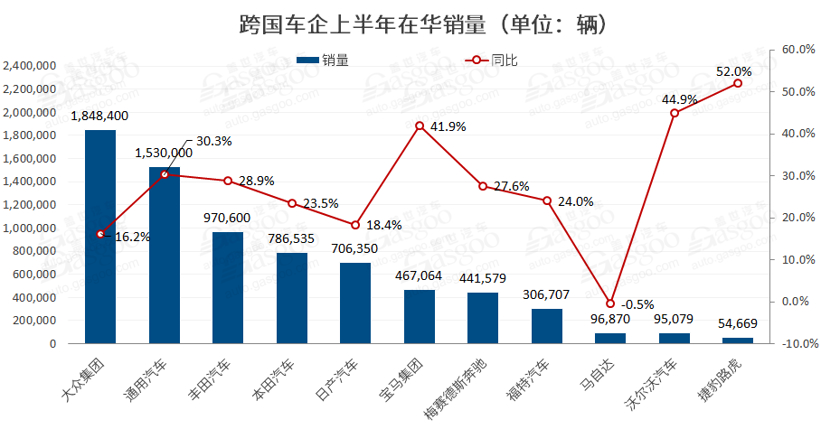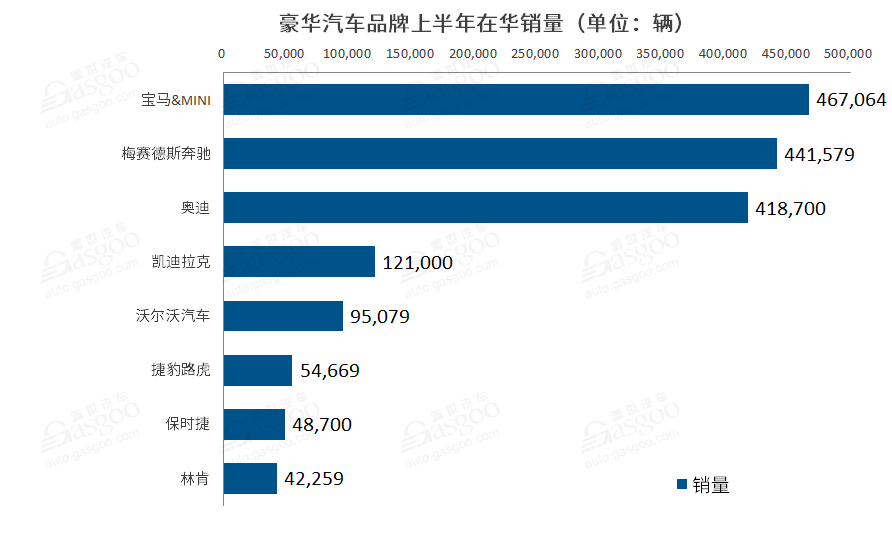In addition to Weibo, there is also WeChat
Please pay attention

WeChat public account
AutoBeta


2024-11-21 Update From: AutoBeta autobeta NAV: AutoBeta > News >
Share
AutoBeta(AutoBeta.net)07/31 Report--
Thanks to the improvement of China's overall auto market, car companies such as Volkswagen, General Motors and Toyota all achieved varying degrees of growth in sales in China in the first half of the year. The media compiled a list of the top 10 sales of multinational car companies in China in the first half of 2021, according to official data released by car companies. Thanks to the improvement of the car market, most car companies achieved varying degrees of growth in sales in China in the first half of the year, but the sales performance of individual car companies is not optimistic.

Judging from the published list, the top two sales of multinational car companies in China are Volkswagen and General Motors. China, as Volkswagen's largest single market, sold 1.8462 million vehicles in the first half of this year, up 16.2% from the same period last year, but failed to beat the global average of Volkswagen, such as 50.5% in the United States and 48.4% in Canada. Feng Sihan, CEO of Volkswagen Group (China), explained: "the automotive industry is facing the challenge of shortage of semiconductor chips in the second quarter, which makes our production capacity unable to meet a large number of customer demand."

GM China owns five car brands: Buick, Chevrolet, Cadillac, Wuling and Baojun. GM sold more than 1.53 million vehicles in China in the first half of this year, up 30.3% from the same period last year. In terms of specific brands, Buick, Chevrolet and Cadillac sold a total of 449000, 127000 and 121000 vehicles in the first half, while Wuling and Baojun sold 138000 and 693000 vehicles respectively in the first half. Through data comparison, sales of GM brands other than Cadillac in the second quarter were slightly lower than in the first quarter, and it is speculated that GM in China is also affected by the shortage of chips. supply limited chips to Cadillac, which has more profit margins.

The third and fifth car companies are Toyota, Honda and Nissan. Toyota released sales figures showing that Toyota sold 5467218 vehicles in the first half of 2021, an increase of 31.3% over the same period last year, surpassing Volkswagen to become the number one car company in the world. However, Toyota lagged far behind Volkswagen in the Chinese market, where it sold 970600 vehicles in the first half of the year, up 28.9% from a year earlier and only half as much as Volkswagen. Toyota in China mainly has Toyota and Lexus brand sales, and compared with Volkswagen, Audi, Skoda, Porsche and so on, Toyota underperformed Volkswagen is also expected.
Honda China and Nissan China sold 786535 and 706350 vehicles respectively in the first half of the year. Compared with the two car companies, Nissan has a relatively large disadvantage. Nissan mainly relies on Xuanyi, Teana, Qijun and Xiaoke models in China, while the Qichen brand makes little contribution to Nissan's sales, while compared with Honda, its two joint ventures in China, Guangzhou Automobile Honda and Dongfeng Honda, have implemented a two-car strategy, including Accord, CR-V, colorful Intelligence, Civic and other models, and sales are also ahead of Nissan models.

As one of the Japanese car companies, Mazda's sales declined in the first half of the year, with 0.5 to 96870 tasty discs, the only car company on the list. Although Changan Mazda's sales rose as a whole, FAW Mazda never recovered. It has pulled up Mazda's sales in China for a long time, and the news that FAW Mazda will be merged into Changan Mazda continues to spread.
Ford sold 306707 vehicles in the first half of the year, up 24.0 per cent from a year earlier. Ford also has two joint ventures in China, Jiangling Ford and Changan Ford. Changan Ford is mainly committed to the passenger car market, and Jiangling Ford is mainly committed to the commercial vehicle market. Ford, by contrast, sells far more commercial vehicles than passenger cars.
Let's take a look at luxury brands. China's auto market as a whole showed a high-end development trend in the first half of this year, and the market performance of luxury cars was particularly strong. In this context, most luxury brands have also performed quite well in China. Competition between Mercedes-Benz and BMW remains fierce in the first-tier luxury brand camp, with BMW's sales in China rising 41.9 per cent to 467000 vehicles in the first half from a year earlier, making it once again the best-selling luxury carmaker in China. Mercedes-Benz also did not underperform in China in the first half, with sales rising 27.6 per cent year-on-year to 442000 vehicles, a record high, but still lower than BMW.

Volkswagen won the top spot in the Chinese market in the first half of the year, which has something to do with the strong exports of Audi and Porsche. Audi brand sold 418700 vehicles in the first half of this year, up 38.4% from the same period last year, setting a new high in China during the same period, but it also lost to BMW and Mercedes-Benz.
As the leader in the second-tier luxury brand camp, Cadillac also performed very well in China in the first half of the year, with sales of about 64000 vehicles, up 9.1 per cent from a year earlier. In addition, Jaguar Land Rover's sales in China grew by 52% in the first half of the year, Volvo's sales in China reached an all-time high in the first half of the year, and Lincoln's sales rose 111.4% from a year earlier, the highest first-half sales record since entering China.
Welcome to subscribe to the WeChat public account "Automotive Industry Focus" to get the first-hand insider information on the automotive industry and talk about things in the automotive circle. Welcome to break the news! WeChat ID autoWechat
Views: 0
*The comments in the above article only represent the author's personal views and do not represent the views and positions of this website. If you have more insights, please feel free to contribute and share.











© 2024 AutoBeta.Net Tiger Media Company. All rights reserved.